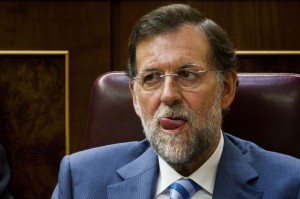
At the end of last year, I spoke to several political analysts about the year ahead, for Iberosphere’s preview of Spain in 2013. One of the questions I asked them was about how safe Mariano Rajoy’s political position was. The experts were fairly unanimous: the prime minister may be under pressure due to the economic crisis, but he has a congressional majority and he’s safe, at least until the next general election, expected in 2015.
A few months on, things look slightly different. In January the Bárcenas corruption scandal exploded, the biggest of its kind in recent Spanish history. Its substantial allegations taint the governing Partido Popular (PP), several of its senior figures and Rajoy. But, to the dismayed resignation of many Spaniards, Bárcenas is looking ominously like just another graft case, dragging on in the background while those it sullies refuse to resign and carry on in their posts, albeit with eroded credibility.
But despite this apparent victory of sorts for Rajoy (one he would no doubt attribute to sitting tight and saying very little), his position still looks less secure than at any time since taking power in December 2011. And that’s more because of an economy that’s sinking further into crisis than the PP’s silver-quiffed ex-treasurer.
The government has sought to blame the Socialists for the country’s current deficit, banking crisis, lack of growth and unemployment rate, but Spaniards are increasingly harking back to how Rajoy behaved in opposition. Phrases such as this, aimed at then Prime Minister José Luis Rodríguez Zapatero in 2010, are coming back to haunt him:
“A man who governs a country where 4.5 million people are out of work is carrying out the most anti-social policies that can be practiced.”
The obvious response, three years on, is: what kind of policies is Rajoy implementing, having allowed the jobless line to stretch to 6.2 million?
At the moment, what’s worrying Rajoy in political terms is almost certainly not the anger of the political left in Congress, the unions, the indignados, and protesting health and education workers – in other words, “the usual suspects”; it’s the growing discontent among sectors who would normally form his support base.
El Mundo newspaper has never been his biggest cheerleader, but does sit firmly in the PP’s own territory of the political right. In Sunday’s edition, editor Pedro J. Ramírez penned a typically overlong, but telling, op-ed piece in which he compared Rajoy to Kaká, Real Madrid’s misfiring, underused, and out-of-favour playmaker (the comparison sprang from Rajoy’s own weirdly human assertion in an old interview that if he were a footballer, he’d play behind the striker, “like Kaká, Cesc, or Iniesta.”)
Ramírez concludes that each Kaká goal has cost Real Madrid around €4 million of his transfer fee. He adds: “How much will Rajoy’s feebleness end up costing Spaniards?”
Meanwhile, on Monday, Rajoy attended an event hosted by the Instituto de Empresa Familiar, where business leaders took turns to take swipes at government economic policy.
The impression increasingly being created by Rajoy’s government is of an administration paralysed by a cocktail of inertia and panic. Rajoy sees the recent return of the Spanish risk premium – the spread of Spanish bonds – to sustainable levels as proof that the country doesn’t need a sovereign bailout and that his wait-and-see style pays off. And in the wake of the publication of the record-high unemployment figures, he reinforced his image of inaction, by calling for “patience”.
Meanwhile, reports of divisions within the Cabinet are rife, including policy discord between Finance Minister Cristóbal Montoro and the more radical Economy Minister Luis de Guindos. Despite several ministers making strong cases to be replaced, Rajoy, we are told, “doesn’t sack”. And similar reports tell of a prime minister surrounded by a cabal of yes-folk advisors who neither challenge him nor offer alternatives to current policy.
Spain’s anti-leader
Understandably, regional PP “barons” are believed to be less supportive, seeing how the central government’s woes are eroding their own political capital.
This image problem is exacerbated by Rajoy’s own reluctance to address Spaniards directly. He appears in Congress for Punch-and-Judy-type exchanges with the opposition, but refuses to make major announcements himself or appear regularly before the press, compounding the image of an anti-leader, locked away in his office, resisting big decisions and trusting that time will heal Spain’s ills.
In his op-ed, Ramírez concludes: “There’s no alternative, either the prime minister changes, or we must change prime minister.”
At the moment, that’s a bit melodramatic. But Rajoy is losing ground at an alarming rate for a leader who is only 16 months into his tenure. And the fact that a massive corruption scandal isn’t the worst of his problems paints an all-too-clear picture of his predicament.
Leave a Reply
You must be logged in to post a comment.